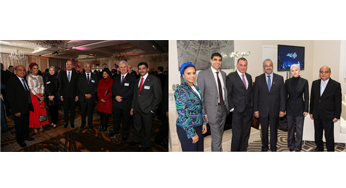Commercial Bank takes part in annual IMF and IIF meetings in Washington DC

27 October 2013
Senior executives from the Bank attended, including Andrew Stevens and Abdulla Saleh Al Raisi
Doha, Qatar: The Commercial Bank of Qatar (“Commercial Bank”) took part last week in the 2013 Annual Membership Meetings of the Institute of International Finance (IIF) and the International Monetary Fund (IMF) in Washington DC. The Conference is one of the world’s most important financial and economic conferences and is regularly attended by key figures from the world of finance, politics and economics, including the world’s most prominent finance ministers and central bankers. Held annually in a large global financial centre, it welcomes banks and multilateral development institutions from important countries all over the world, including several banks from Qatar and the GCC.
The Commercial Bank Group, including its alliance banks, National Bank of Oman, United Arab Bank and Alternatifbank, attended the conference and organised a broad programme of meetings and events over the week. The Group used the conference for bilateral meetings with banks from various countries, to build relationships and to grow business in new areas, including demonstrating the increasing regional strength of the Commercial Bank Alliance. The team met with almost 40 relationship bankers and other institutions during the events, establishing useful contacts with many new banks from developing countries.
Furthermore, the Qatari banks hosted a very successful and well-attended reception, with the Qatari Finance Minister, the Governor of Qatar Central Bank (QCB) and the Qatar Ambassador to the USA.
During the two days, discussions of key issues in the global economy took place in the scheduled seminars, including debate about the global economic outlook, the financial globalisation of capital flows and long term financing, quantitative easing, regulatory overview, recovery and resolution, the future of finance, financial inclusion, and breakout sessions on regional issues.

